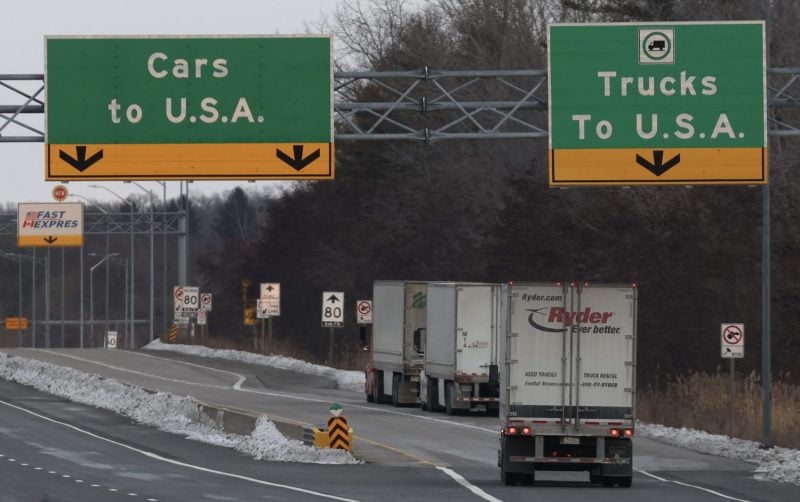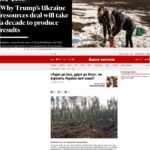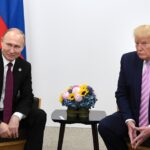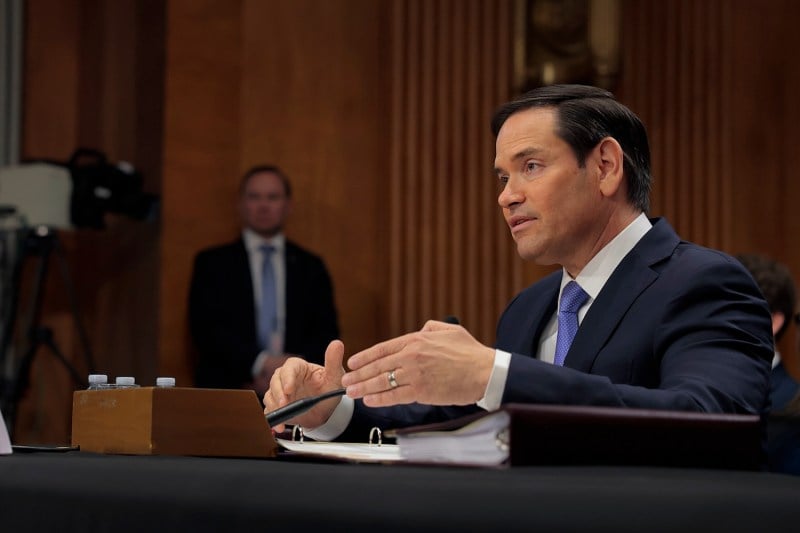Trump’s Tariffs Are an Unconstitutional Power Grab

Trump’s Tariffs Are an Unconstitutional Power Grab
Declaring a national emergency to exact concessions is a ploy to seize authority.
Trucks approach the Lewiston-Queenston Bridge border crossing to the United States in Niagara Falls, Canada, on Feb. 4. Joe Raedle/Getty Images
After announcing sweeping new tariffs on the United States’ top three trading partners, U.S. President Donald Trump seems to have agreed to a 30-day pause on any new duties on Canada and Mexico while leaving those on China in place. The final outcome is still uncertain, and the drama that unfolded over the last week should not distract from the bigger picture: With his decrees on trade, Trump is making an unconstitutional power grab by using the declaration of a national emergency to grant himself authority he does not have. Congress, whose constitutional powers to regulate trade Trump has usurped, should act swiftly to retain its authority and bring back stability to U.S. trade policy.
In announcing the tariffs, Trump invoked the 1977 International Emergency Economic Powers Act (IEEPA), which gives a U.S. president sweeping powers to regulate the economy during wartime or another emergency caused by a foreign threat. The law essentially grants a president extraordinary economic powers “to deal with any unusual and extraordinary threat” if he “declares a national emergency with respect to such threat.” The White House outlined its view of the current threat in Proclamation 10886, which on Jan. 20 declared a national emergency at the U.S.-Mexico border, supposedly “overrun by cartels, criminal gangs, known terrorists, human traffickers, smugglers, unvetted military-age males from foreign adversaries, and illicit narcotics that harm Americans, including America.”
After announcing sweeping new tariffs on the United States’ top three trading partners, U.S. President Donald Trump seems to have agreed to a 30-day pause on any new duties on Canada and Mexico while leaving those on China in place. The final outcome is still uncertain, and the drama that unfolded over the last week should not distract from the bigger picture: With his decrees on trade, Trump is making an unconstitutional power grab by using the declaration of a national emergency to grant himself authority he does not have. Congress, whose constitutional powers to regulate trade Trump has usurped, should act swiftly to retain its authority and bring back stability to U.S. trade policy.
In announcing the tariffs, Trump invoked the 1977 International Emergency Economic Powers Act (IEEPA), which gives a U.S. president sweeping powers to regulate the economy during wartime or another emergency caused by a foreign threat. The law essentially grants a president extraordinary economic powers “to deal with any unusual and extraordinary threat” if he “declares a national emergency with respect to such threat.” The White House outlined its view of the current threat in Proclamation 10886, which on Jan. 20 declared a national emergency at the U.S.-Mexico border, supposedly “overrun by cartels, criminal gangs, known terrorists, human traffickers, smugglers, unvetted military-age males from foreign adversaries, and illicit narcotics that harm Americans, including America.”
Trump expanded the emergency beyond the southern border to also cover “the public health crisis of deaths due to the use of fentanyl and other illicit drugs,” claiming insufficient action by Canada and China to interdict shipments. His response to these claimed threats was a 25 percent tariff on imports from Mexico, 25 percent on imports from Canada (except energy at 10 percent), and an additional 10 percent on imports from China. Since Chinese goods are currently charged with an average rate of 10 percent and most tariffs on Canada and Mexico are near zero, Trump’s decree would have imposed higher levies against them than against China, a U.S. adversary, and put a significant shock to North American trade. Experts have called these tariff actions “reckless” and a “self-inflicted wound to the American economy,” while companies have warned that widespread tariffs will further upend supply chains and stoke inflation.
Historically, presidential authority under the IEEPA has been used to impose an array of sanctions that hit U.S. adversaries directly, such as export embargoes and the freezing of foreign assets. But it has never been used to raise tariffs on imports into the United States—which U.S. importers and ultimately consumers, not the targeted countries, pay. Nor has the law ever been used to punish allies and partners, such as Canada and Mexico. The predecessor statute that the IEEPA replaced, the 1917 Trading With the Enemy Act, was used by U.S. President Richard Nixon to levy a 10 percent across-the-board import tariff to address a balance of payments crisis, with the intent of creating leverage to force Japan and West Germany to revalue their currencies, which Washington saw as giving their exporters an unfair advantage. The tariff was a temporary measure and soon lifted. Nixon’s loose interpretation of the old law and use against friendly countries in peacetime was, in fact, the precise reason Congress worked on tightening the statute and replacing it with the IEEPA.
The legal challenges that sprang from Nixon’s actions are instructive today. In United States v. Yoshida International, the U.S. Court of Customs and Patent Appeals ruled in 1975 that measures implemented by the president must have an “eminently reasonable relationship” with the declared emergency. In other words, there needs to be a causal link between the emergency and sanctions response. The court upheld Nixon’s action because the tariff “had a direct effect on our nation’s balance of trade and, in turn, on its balance of payments deficit and its international monetary reserves.” Today, by contrast, it is a stretch of the imagination to suggest that across-the-board import tariffs have an “eminently reasonable relationship” to the domestic problem of fentanyl use and concerns over organized crime in the United States.
The fact that U.S. deaths from synthetic opioids such as fentanyl began to decline in 2023 raises additional questions about Trump’s invocation of the IEEPA, which is restricted to emergencies that are both unusual and extraordinary. What’s more, one day after proclaiming his tariffs, Trump took to his Truth Social platform to suggest that trade with the United States is a form of subsidy to Canada and that Canada should become the 51st U.S. state. This range of statements and possible motivations further obscures the relationship between the claimed emergency and Trump’s tariff action.
Although a president has ample discretion to take broad actions in times of national emergency, there is little evidence that an emergency exists—or that the emergency as described is even loosely connected to the remedy being offered. Even the weak guardrails contained in the IEEPA should suffice for Congress to check the president’s actions. First, it could terminate the emergency through a joint resolution; that, however, would need a veto-proof supermajority. Terminating the emergency also rescinds any actions taken by the president linked to the emergency. Second, Congress should amend the IEEPA to clarify that it does not allow the president to levy tariffs, and legislation to this end has already been introduced. Article 1, Section 8 of the U.S. Constitution gives Congress the express authority to regulate commerce with foreign nations. This is a perfect example of where Congress should take back its power and rein in presidential abuse of delegated authority.
If Congress fails to act, there is still the courts. Firms affected by tariffs can challenge Trump’s decree. Furthermore, the U.S. Supreme Court’s 2024 landmark decision in Loper Bright Enterprises v. Raimondo overturned the previous practice of deferring to federal agencies—i.e. the executive branch—whenever vague language in the law left room for interpretation. Now, that final interpretation lies with the courts. This emphasizes the Supreme Court’s renewed skepticism towards broad statutory interpretations and lends persuasive power to the argument that the president is taking too much liberty with the IEEPA.
Trump is knowingly and unseriously using a fictitious emergency to attack U.S. allies in hopes of causing enough chaos to extract unrelated concessions. Solving the drug crisis is a domestic problem, not a trade issue. Trump has invoked security threats to address economic concerns in the past, such as when he imposed a 25 percent tariff on steel—mostly on U.S. allies—during his first term; at the time, lawyers at the U.S. Justice Department absurdly claimed that, hypothetically, peanut butter imports could be considered a national security threat and warrant sanctions. But unlike the statute Trump used to impose tariffs on steel, the IEEPA has far fewer guardrails and procedural requirements, meaning that there is little to check Trump’s interpretation of an emergency. While some of the tariffs are now on hold, there’s no guarantee that Trump won’t continue to abuse the IEEPA on these and other allies and partners. To use emergency powers as a tool of chaos and leverage in unrelated negotiations—and directed at U.S. allies and partners—is a blatant, unconstitutional abuse of power. Congress and the courts must act to stop it.
This post is part of FP’s ongoing coverage of the Trump administration. Follow along here.
Inu Manak is a fellow for trade policy at the Council on Foreign Relations. X: @inumanak
More from Foreign Policy
-

Russian President Vladimir Putin looks on during a press conference after meeting with French President in Moscow, on February 7, 2022. The Domino Theory Is Coming for Putin
A series of setbacks for Russia is only gaining momentum.
-

The container ship Gunde Maersk sits docked at the Port of Oakland on June 24, 2024 in Oakland, California. How Denmark Can Hit Back Against Trump on Greenland
The White House is threatening a close ally with a trade war or worse—but Copenhagen has leverage that could inflict instant pain on the U.S. economy.
-

Donald Trump speaks during an event commemorating the 400th Anniversary of the First Representative Legislative Assembly in Jamestown, Virginia on July 30, 2019. This Could Be ‘Peak Trump’
His return to power has been impressive—but the hard work is about to begin.
-

US Secretary of State Marco Rubio greets employees at the State Department in Washington, DC, on January 21, 2025. The National Security Establishment Needs Working-Class Americans
President Trump has an opportunity to unleash underutilized talent in tackling dangers at home and abroad.











Join the Conversation
Commenting on this and other recent articles is just one benefit of a Foreign Policy subscription.
Already a subscriber?
.
Subscribe
Subscribe
View Comments
Join the Conversation
Join the conversation on this and other recent Foreign Policy articles when you subscribe now.
Subscribe
Subscribe
Not your account?
View Comments
Join the Conversation
Please follow our comment guidelines, stay on topic, and be civil, courteous, and respectful of others’ beliefs.
Change your username |
Log out
Change your username:
CANCEL
Confirm your username to get started.
The default username below has been generated using the first name and last initial on your FP subscriber account. Usernames may be updated at any time and must not contain inappropriate or offensive language.